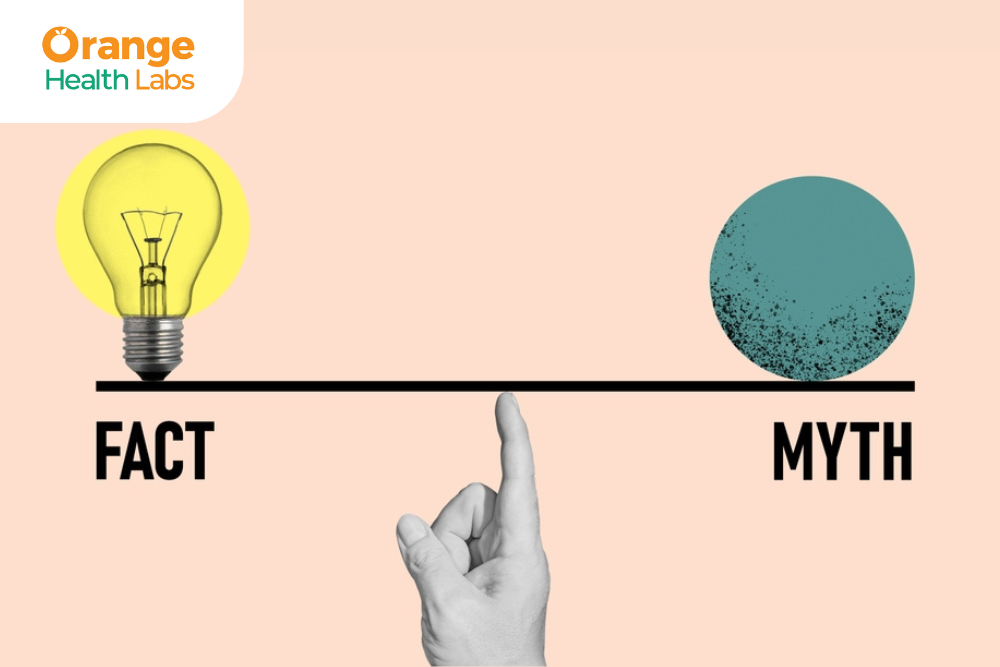Search for tests or checkups
SupportDebunking Common Myths About HIV Testing

The human immunodeficiency virus (HIV) is a virus that targets the immune system, the body's natural defence against disease. If left untreated, HIV can weaken the immune system to the point that it is unable to fight infection. Furthermore, HIV can progress to acquired immune deficiency syndrome (AIDS), which can be fatal. HIV has claimed millions of lives so far, and it continues to progress worldwide making it a major global health issue. Although there is currently no cure for HIV, with adequate medical care, HIV can be managed. People with HIV who receive proper treatment can live long and healthy lives.
Finding out your HIV status, whether you test positive or negative for the disease, is an important step toward receiving treatment and preventing the disease from spreading. Knowing your HIV status is also an excellent method to protect your health and that of others you care about.
Myth 1: HIV Testing Is Only for Certain Groups
One common myth is that HIV/AIDS only affects certain groups, such as the LGBTQ+ community or people who engage in certain sexual practices. The Centers for Disease Control and Prevention (CDC) recommends at least one HIV Test for every individual between the ages of 13 and 64 years as a part of their routine health care. However, if you have had multiple sex partners or you are unaware of your partner’s sexual history, it is recommended to get tested more frequently. Bisexual and gay men who are sexually active may benefit from more regular testing (e.g., every 3–6 months). As part of preventive prenatal care, all pregnant women should get checked for HIV, so they can stay healthy and safeguard their child.
HIV can infect anyone regardless of their age, lifestyle, or sexual orientation. The virus spreads mostly through unprotected sexual contact, needle sharing (for example, while taking injectable drugs), and transmission from an infected mother to her child. Hence, everyone should get tested for HIV, irrespective of their lifestyle, age, or relationship status, to help combat the epidemic and raise global awareness.
Myth 2: HIV Tests Are Not Reliable
Despite the common belief, tests for HIV are highly accurate. To diagnose HIV, your doctor can request you to take any one of three types of tests:
- Nucleic Acid (NAT) Test: Commonly referred to as a viral load test, this test detects the actual amount of virus in your blood. This test requires a sample of blood drawn from a vein to check for HIV.
- Antibody Test: This test checks for antibodies produced against HIV in your blood or oral fluid.
- Antigen / Antibody Tests: These tests check for both HIV antibodies and antigens in your blood. Once a person is exposed to HIV, antigens appear sooner than antibodies.
Despite their accuracy, HIV tests cannot detect HIV immediately after you have been exposed to the virus. The body takes some time (referred to as the window period) to produce antibodies against the virus. It is recommended to get tested after the window period.
If the screening test returns a positive result, a follow-up test is typically performed. A variety of tests may be used to detect the virus itself, detect antibodies with greater accuracy than screening tests, and distinguish between the two types of viruses, HIV-1 and HIV-2. Consult with your healthcare professional to check which test would be most suitable for you.
Myth 3: A Positive Test Means a Death Sentence
With advances in medical research and the development of antiretroviral therapy (ART), HIV is not considered an unavoidable death sentence. While HIV cannot be cured, ART can help individuals with HIV live longer, healthier lives. Additionally, ART lowers the chance of HIV transmission by reducing the viral load in an individual. HIV-positive individuals who maintain an undetectable viral load have a reduced risk of transmitting HIV to their partners. A daily prescription of HIV medications is given to the individual when they start ART. Early detection, access to healthcare, and treatment adherence are critical in stopping the progression of HIV to AIDS.
To manage HIV, it's important to get medical attention as soon as possible. If you have HIV, you can change your lifestyle to include eating healthy foods, regular exercise, avoiding smoking and heavy drinking. Taking your medication every day, maintaining your routine medical and dental care, and effectively managing stress can help you to effectively manage HIV.
Myth 4: You Can Tell If Someone Has HIV by Looking at Them
Earlier some individuals with HIV, particularly those receiving antiretroviral therapy, experienced changes in skin colour, fat loss (noticed in the face, buttocks, and limbs) and fat accumulation (noticed in the breasts, midsection, and on the back of the neck).
However, these days, simply looking at someone does not reveal if they have HIV as newer HIV drugs are less likely to cause the redistribution of body fat. Moreover, lifestyle modification with a combination of exercises and healthy food can help build muscle and reduce fat buildup. Limiting your sun exposure could help in protection of your skin. Your healthcare professional may prescribe certain additional medications to lessen these effects as well. Therefore, getting an HIV test is the only way to find out if you have HIV. People who are tested and find out that they do not have HIV can make careful choices regarding sex, drug use, and health care that will prevent them from contracting HIV.
Myth 5: HIV Testing Is Complicated and Invasive
Although it was believed earlier that HIV tests are complicated and invasive, with advances in medicine, HIV tests at home are now more accurate and less complicated than earlier. For the testing process, a sample of blood is drawn from a vein in your arm. The area over the vein is cleaned and a needle inserted in the vein. A bandage is then placed over the needle insertion site. For the self-test, a swab of your gums (an oral sample) is required.
An HIV self-test (rapid self-test – antibody test) can be done at your convenience in your apartment or at a private location and you can get the results within 20 minutes.
You can also book the HIV test through a laboratory and opt for a sample collection from your home. A vaccinated and skilled eMedic will appear at the location chosen by you within an hour for the sample collection. Your results will be sent to you via WhatsApp and Email within 6 hours.
These advances in HIV testing ensure the confidentiality of test results, reasonable cost, fast and accurate results, and convenience.
Conclusion
Debunking common HIV/AIDS myths can help individuals obtain a better understanding of the illnesses, eliminate stigma, and foster empathy. Individuals must be well-informed about the transmission, treatment, and daily reality of living with HIV/AIDS. By challenging the misunderstandings and encouraging evidence-based information-seeking in the society may help to create a more supportive and inclusive environment for HIV/AIDS patients.
Getting an HIV test and encouraging your partner and others to do the same is essential for preventing the transmission of HIV. Knowing your HIV status will facilitate early treatment and allow you to live a full and healthy life. Book your test today and stay HIV-free!
Book HIV Test in your city: HIV Test in Mumbai | HIV Test in Bangalore | HIV Test in Noida | HIV Test in Hyderabad | HIV Test in Gurgaon | HIV Test in Faridabad | HIV Test in Delhi

STDs in the Digital Age: Navigating the Risks of Online Dating and Hookup Apps

How Often Should You Get Tested for STDs?
